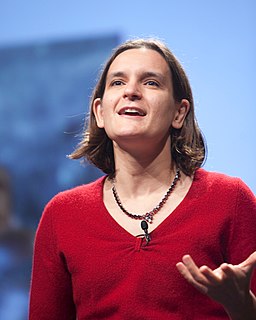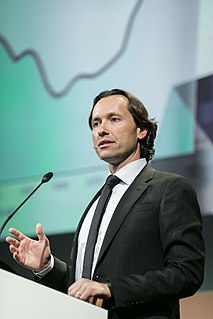
Extreme poverty, deep poverty, abject poverty, absolute poverty, destitution, or penury, is the most severe type of poverty, defined by the United Nations (UN) as "a condition characterized by severe deprivation of basic human needs, including food, safe drinking water, sanitation facilities, health, shelter, education and information. It depends not only on income but also on access to services" Historically, other definitions have been proposed within the United Nations.
Development economics is a branch of economics which deals with economic aspects of the development process in low income countries. Its focus is not only on methods of promoting economic development, economic growth and structural change but also on improving the potential for the mass of the population, for example, through health, education and workplace conditions, whether through public or private channels.

In international relations, aid is – from the perspective of governments – a voluntary transfer of resources from one country to another.

Poverty reduction, poverty relief, or poverty alleviation, is a set of measures, both economic and humanitarian, that are intended to permanently lift people out of poverty.
Michael Robert Kremer is an American development economist and University Professor in economics and public policy at the University of Chicago. He is the founding director of the Development Innovation Lab at the Becker Friedman Institute for Economics. Kremer served as the Gates Professor of Developing Societies at Harvard University until 2020. In 2019, he was jointly awarded the Nobel Memorial Prize in Economics, together with Esther Duflo and Abhijit Banerjee, "for their experimental approach to alleviating global poverty."
Michael Paul Todaro is an American economist and a pioneer in the field of development economics.

Esther Duflo, FBA is a French–American economist who is the Abdul Latif Jameel Professor of Poverty Alleviation and Development Economics at the Massachusetts Institute of Technology (MIT). She is the co-founder and co-director of the Abdul Latif Jameel Poverty Action Lab (J-PAL), which was established in 2003. She shared the 2019 Nobel Memorial Prize in Economic Sciences with Abhijit Banerjee and Michael Kremer, "for their experimental approach to alleviating global poverty".
Human development is the process characterized by the variation of material conditions. These conditions influence the possibilities of satisfying needs and desires. They also explore and realize the physical and psychic, biological and cultural, individual and social potentials of each person. It is also the name of the science that seeks to understand how and why the people of all ages and circumstances change or remain the same over time. It involves studies of the human condition with its core being the capability approach. The inequality adjusted Human Development Index is used as a way of measuring actual progress in human development by the United Nations. It is an alternative approach to a single focus on economic growth, and focused more on social justice, as a way of understanding progress.

stickK.com is an American internet company that enables users to make commitment contracts in order to reach their personal goals.

Abhijit Vinayak Banerjee is an India-born naturalized-American economist who is currently the Ford Foundation International Professor of Economics at Massachusetts Institute of Technology. Banerjee shared the 2019 Nobel Memorial Prize in Economic Sciences with Esther Duflo and Michael Kremer "for their experimental approach to alleviating global poverty". He and Esther Duflo, who are married, are the sixth married couple to jointly win a Nobel Prize.

Innovations for Poverty Action (IPA) is an American non-profit research and policy organization founded in 2002 by economist Dean Karlan. Since its foundation, IPA has worked with over 400 leading academics to conduct over 600 evaluations in 51 countries. The organization also manages the Progress out of Poverty Index.

The Abdul Latif Jameel Poverty Action Lab (J-PAL) is a global research center working to reduce poverty by ensuring that policy is informed by scientific evidence. J-PAL conducts randomized impact evaluations to answer critical questions in the fight against poverty, and builds partnerships with governments, NGOs, donors, and others to generate new research, share knowledge, and scale up effective programs. As of 2018, more than 400 million people have been reached by scale-ups of programs found to be effective by J-PAL affiliates’ research.

Dean S. Karlan is an American development economist. He is Professor of Economics and Finance at Northwestern University and the co-director of the Global Poverty Research Lab at the Buffett Institute for Global Studies. He is a Research Fellow and member of the Executive Committee of the Board of Directors at the Abdul Latif Jameel Poverty Action Lab (J-PAL) at the Massachusetts Institute of Technology. Karlan is also the president and founder of Innovations for Poverty Action (IPA), a New Haven, Connecticut, based research outfit dedicated to creating and evaluating solutions to social and international development problems. Along with economists Jonathan Morduch and Sendhil Mullainathan, Karlan served as director of the Financial Access Initiative (FAI), a consortium of researchers focused on substantially expanding access to quality financial services for low-income individuals. He is also a co-founder of stickK.com and co-founder of ImpactMatters.

Erik Thorbecke is a development economist. He is a co-originator of the widely used Foster-Greer-Thorbecke poverty measure and played a significant role in the development and popularization of Social Accounting Matrix. Currently, he is H. E. Babcock Professor of Economics, Emeritus, and Graduate School Professor at Cornell University.

Poor Economics: A Radical Rethinking of the Way to Fight Global Poverty (2011) is a non-fiction book by Abhijit V. Banerjee and Esther Duflo, both professors of Economics at Massachusetts Institute of Technology (MIT). The book reports on the effectiveness of solutions to global poverty using an evidence-based randomized control trial approach. It won the 2011 Financial Times and Goldman Sachs Business Book of the Year Award.

Edward "Ted" Andrew Miguel is the Oxfam Professor of Environmental and Resource Economics in the Department of Economics at University of California, Berkeley, USA. He is the founder and faculty director of the Center for Effective Global Action (CEGA) at U.C. Berkeley.
The impact of microcredit is a subject of much controversy. Proponents state that it reduces poverty through higher employment and higher incomes. This is expected to lead to improved nutrition and improved education of the borrowers' children. Some argue that microcredit empowers women. In the US and Canada, it is argued that microcredit helps recipients to graduate from welfare programs. Critics say that microcredit has not increased incomes, but has driven poor households into a debt trap, in some cases even leading to suicide. They add that the money from loans is often used for durable consumer goods or consumption instead of being used for productive investments, that it fails to empower women, and that it has not improved health or education.

The Heller-Hurwicz Economics Institute was launched in 2010 in order to promote socioeconomic research.

The World Marketing Summit (WMS) is an independent global organization, headquartered in Toronto, Canada, committed to "Creating a Better World through Marketing" and thereby alleviating poverty. WMS aims to improve the state of the world by engaging the global leaders and entrepreneurs to create a poverty-free world.

Bad Samaritans: The Myth of Free Trade and the Secret History of Capitalism is a book about economics written by Ha-Joon Chang, a South Korean institutional economist specializing in development economics. It criticizes mainstream economics of globalization and neo-liberalism. Chang claims that developed countries want developing countries to change their economic policy and open their markets. Rich and powerful governments and institutions are actually "Bad Samaritans"; their intentions may be worthy but their simplistic, free-market ideology and poor understanding of history leads them into policy errors.















